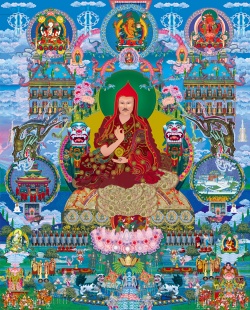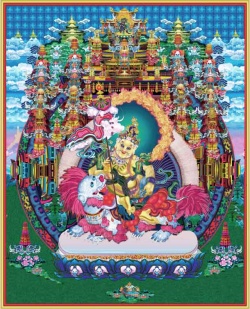Difference between revisions of "Disrobing"
| Line 1: | Line 1: | ||
| − | {{DisplayImages|1414|1767|1308 | + | {{DisplayImages|1414|1767|1308}} |
| − | The first rule in the [[Patimokkha]] opens with the statement that it — and, by extension, every other rule in the [[Patimokkha]] — applies to all [[bhikkhus]] who have not disrobed by renouncing the training and returning to the lay [[life]]. Thus the [[Vibhanga]] begins its explanations by discussing what does and does not count as a valid act of disrobing. Because this is, in effect, the escape clause for all the rules, I am discussing it first as a separate chapter, for if a [[bhikkhu]] disrobes in an invalid [[manner]], he still counts as a [[bhikkhu]] and is [[subject]] to the rules whether he realizes it or not. If he then were to break any of the [[Parajika]] rules, he would be disqualified from ever becoming a [[bhikkhu]] again in this [[lifetime]]. | + | The first rule in the [[Patimokkha]] opens with the statement that it — and, by extension, every other rule in the [[Patimokkha]] — applies to all [[bhikkhus]] who have not [[disrobed]] by renouncing the training and returning to the lay [[life]]. Thus the [[Vibhanga]] begins its explanations by discussing what does and does not count as a valid act of [[disrobing]]. Because this is, in effect, the escape clause for all the rules, I am discussing it first as a separate chapter, for if a [[bhikkhu]] [[disrobes]] in an invalid [[manner]], he still counts as a [[bhikkhu]] and is [[subject]] to the rules whether he realizes it or not. If he then were to break any of the [[Parajika]] rules, he would be disqualified from ever becoming a [[bhikkhu]] again in this [[lifetime]]. |
| − | To | + | To [[disrobe]], a [[bhikkhu]] with firm intent states in the presence of a {{Wiki|witness}} words to the effect that he is renouncing the training. The validity of the act depends on four factors: |
1. The [[bhikkhu's]] [[state of mind]]. | 1. The [[bhikkhu's]] [[state of mind]]. | ||
| Line 15: | Line 15: | ||
[[Intention]]. | [[Intention]]. | ||
| − | He must seriously [[desire]] to leave the {{Wiki|Community}}. If, without actually intending to | + | He must seriously [[desire]] to leave the {{Wiki|Community}}. If, without actually intending to [[disrobe]], he makes any of the statements usually used for [[disrobing]], it does not count as an act of [[disrobing]]. For example, if he makes the statement in jest or is telling someone else how to [[disrobe]], the fact that he mentions the words does not mean that he has [[disrobed]]. Also, if he says one thing and means something else — e.g., if he makes a slip of the {{Wiki|tongue}} — that too does not count. |
The statement. | The statement. | ||
| Line 27: | Line 27: | ||
These four factors cover all that is absolutely necessary for an act of disrobing to be valid. However, each of the different national [[traditions]] has developed a set of formal {{Wiki|ceremonies}} to surround the act — such as making a final {{Wiki|confession}} of all one's offenses and reciting the passage for {{Wiki|reflection}} on one's {{Wiki|past}} use of the four requisites — to give [[psychological]] weight to the occasion and to help minimize any [[sense]] of remorse one may [[feel]] afterwards. | These four factors cover all that is absolutely necessary for an act of disrobing to be valid. However, each of the different national [[traditions]] has developed a set of formal {{Wiki|ceremonies}} to surround the act — such as making a final {{Wiki|confession}} of all one's offenses and reciting the passage for {{Wiki|reflection}} on one's {{Wiki|past}} use of the four requisites — to give [[psychological]] weight to the occasion and to help minimize any [[sense]] of remorse one may [[feel]] afterwards. | ||
| − | Because disrobing is a serious act with strong consequences for one's [[mental]] and [[spiritual]] well being, it should be done only after due [[consideration]]. Once a [[bhikkhu]] decides that he does want to | + | Because [[disrobing]] is a serious act with strong consequences for one's [[mental]] and [[spiritual]] well being, it should be done only after due [[consideration]]. Once a [[bhikkhu]] decides that he does want to [[disrobe]], he would be [[wise]] to follow not only the stipulations given in the texts but also any additional customs dictated by the [[traditions]] of his particular {{Wiki|Community}}, as a sign to himself and to others that he is acting seriously and with due [[respect]] both for the [[religion]] and for himself. |
| + | |||
[[Parajika]] | [[Parajika]] | ||
Revision as of 03:05, 24 March 2014
The first rule in the Patimokkha opens with the statement that it — and, by extension, every other rule in the Patimokkha — applies to all bhikkhus who have not disrobed by renouncing the training and returning to the lay life. Thus the Vibhanga begins its explanations by discussing what does and does not count as a valid act of disrobing. Because this is, in effect, the escape clause for all the rules, I am discussing it first as a separate chapter, for if a bhikkhu disrobes in an invalid manner, he still counts as a bhikkhu and is subject to the rules whether he realizes it or not. If he then were to break any of the Parajika rules, he would be disqualified from ever becoming a bhikkhu again in this lifetime.
To disrobe, a bhikkhu with firm intent states in the presence of a witness words to the effect that he is renouncing the training. The validity of the act depends on four factors:
1. The bhikkhu's state of mind. 2. His intention. 3. His statement. 4. The witness to his statement.
The bhikkhu must be in his right mind. Any statement he makes while insane, crazed with pain, or possessed by spirits does not count.
He must seriously desire to leave the Community. If, without actually intending to disrobe, he makes any of the statements usually used for disrobing, it does not count as an act of disrobing. For example, if he makes the statement in jest or is telling someone else how to disrobe, the fact that he mentions the words does not mean that he has disrobed. Also, if he says one thing and means something else — e.g., if he makes a slip of the tongue — that too does not count.
The statement.
The Vibhanga gives a wide variety of statements that one may use to renounce the training. The most basic one follows the form, "I renounce x," where x may be replaced with the Buddha, the Dhamma, the Sangha, the training, the discipline (vinaya), the Patimokkha, the chaste life, one's preceptor, one's teacher, one's fellow bhikkhus, or any equivalent terms. Other examples follow similar forms, such as, "I am tired of x," "What is x to me?" "X means nothing to me," or "I am well freed of x." A separate form follows the pattern, "Consider me to be y," where y may be replaced with a householder, a lay follower, a novice, a member of another sect, an adherent of another sect, or any other equivalent term.
The Vibhanga stipulates that the statement may not be put in the conditional tense ("Suppose I were to renounce the training"), and the Commentary further stipulates that the "x" statements must be in the present tense. Thus to say, "I have renounced the training," or "I will renounce the training," would not be a valid statement of disrobing.
The witness must be a human being in his or her right mind, and must understand what the bhikkhu says. This rules out the practice legendary in Thailand of bhikkhus who disrobe by taking a Buddha image as their witness, or who disrobe in front of a Bodhi tree on the assumption that the tree deity counts.
These four factors cover all that is absolutely necessary for an act of disrobing to be valid. However, each of the different national traditions has developed a set of formal ceremonies to surround the act — such as making a final confession of all one's offenses and reciting the passage for reflection on one's past use of the four requisites — to give psychological weight to the occasion and to help minimize any sense of remorse one may feel afterwards.
Because disrobing is a serious act with strong consequences for one's mental and spiritual well being, it should be done only after due consideration. Once a bhikkhu decides that he does want to disrobe, he would be wise to follow not only the stipulations given in the texts but also any additional customs dictated by the traditions of his particular Community, as a sign to himself and to others that he is acting seriously and with due respect both for the religion and for himself.
This term, according to the Parivara, derives from a verb meaning to lose or be defeated. A bhikkhu who commits any of the four following offenses has surrendered to his own mental defilements to such an extent that he defeats the purpose of his having become a bhikkhu in the first place. The irrevocable nature of this defeat is illustrated in the Vibhanga with a number of similes: "as a man with his head cut off... as a withered leaf freed from its stem... as a flat stone that has been broken in half cannot be put together again... as a palm tree cut off at the crown is incapable of further growth." A bhikkhu who commits any of these offenses severs himself irrevocably from the life of the Sangha and is no longer considered a bhikkhu.
- * *
1. Should any bhikkhu — participating in the training and livelihood of the bhikkhus, without having renounced the training, without having declared his weakness — engage in the sexual act, even with a female animal, he is defeated and no longer in communion.
2. Should any bhikkhu, in the manner of stealing, take what is not given from an inhabited area or from the wilderness — just as when, in the taking of what is not given, kings arresting the criminal would flog, imprison, or banish him, saying, "You are a robber, you are a fool, you are benighted, you are a thief" — a bhikkhu in the same way taking what is not given is defeated and no longer in communion.
3. Should any bhikkhu intentionally deprive a human being of life, or search for an assassin for him, or praise the advantages of death, or incite him to die (thus): "My good man, what use is this wretched, miserable life to you? Death would be better for you than life," or with such an idea in mind, such a purpose in mind, should in various ways praise the advantages of death or incite him to die, he also is defeated and no longer in communion.
4. Should any bhikkhu, without direct knowledge, boast of a superior human state, a truly noble knowledge and vision as present in himself, saying, "Thus do I know; thus do I see," such that regardless of whether or not he is cross-examined on a later occasion, he — being remorseful and desirous of purification — might say, "Friends, not knowing, I said I know; not seeing, I said I see — vainly, falsely, idly," unless it was from over-estimation, he also is defeated and no longer in communion.


